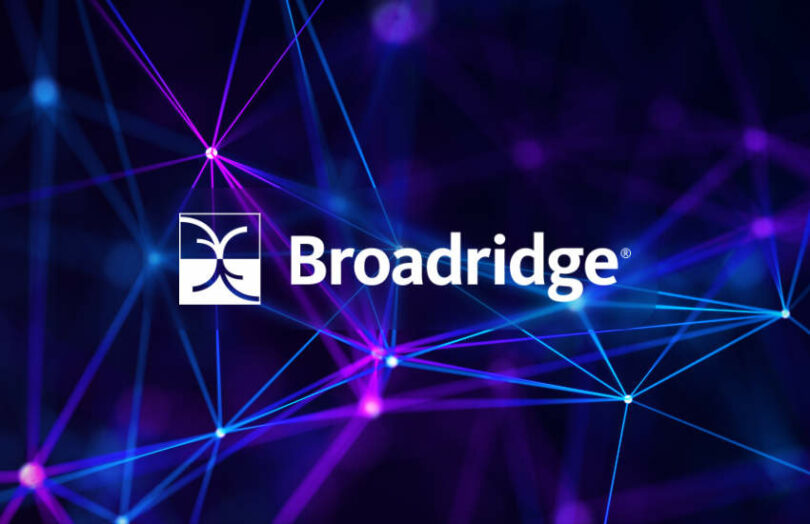In mid-2021, Broadridge launched its Distributed Ledger Repo (DLR) solution, quickly achieving $31 billion in average weekly volumes. That figure is now $50 billion daily or a trillion dollars a month. But the DLT platform is just getting started.
So far, UBS and Societe Generale are two banks that have confirmed they are active on the platform, and it’s expected the number of participants will reach double digits this year, with three currently onboarding.
A typical repo transaction involves one party borrowing cash by selling securities, often Treasuries. There’s an agreement to repurchase the securities at a slightly higher price in the near future. The net effect is a loan with the Treasuries as collateral. DLR enables the agreement, execution and settling of repo transactions on a single ledger.
In some cases, the primary purpose is for a bank to ensure it has the right collateral mix on its balance sheet to comply with regulations. Currently, most of the activity on the DLR platform involves intraday transactions between different entities within a banking group to ensure collateral is in the right place. But that’s just the first step.
As a result of its support of internal transactions, the DLR is able to deliver short term financial returns to users. Broadridge’s Horacio Barakat believes it’s not enough for a DLT-based platform to promise future benefits once the network effects kick in. Instead, DLR provides the intracompany quick win, and the benefits increase as the network expands and supports more external bilateral transactions.
⚠️This is quite a common pattern for distributed ledger solutions. For example, HSBC initially used the Baton Systems DLT FX solution for trillions of dollars of intra-group transactions before using it with Wells Fargo for bilateral FX transactions.⚠️
It’s also comparatively easy to get other group companies to join the platform. But if they want to execute intraday repo transactions with external counterparties, then those organizations have to be on the network. Hence the need to expand the network. Broadridge’s DLR is in the process of transitioning from that intracompany to the external bilateral transaction phase and is currently onboarding three new clients. Hence, the confidence that it will achieve ten participants or more by the end of the year.
“Momentum and interest in the platform continue to grow,” said Barakat. “One of the reasons is the flexibility of the platform and the ability to use the platform for various use cases relating to repo transactions.”
A major benefit of the DLR platform is the ability to execute intraday trades, particularly useful as interest rates rise. But settlement times are flexible and can be agreed upon between counterparties. Other key benefits are the shared workflow and resultant cost savings as well as greater collateral mobility.
How DLR works
DLR uses smart contracts to “mutualize the workflow”. In other words, instead of actions taking place separately on each party’s internal systems, which might not tally with each other, by using smart contracts they are in sync. That’s because the agreement, execution and settling of repo transactions take place on the shared ledger.
The underlying collateral securities are locked and tokenized, enabling ownership to be transferred using smart contracts. As one of the major technology players in the U.S. fixed income market, Broadridge was able to build on top of its existing connectivity with central securities depositories (CSDs) and custodian banks.
Settlement is made by triggering a payment on conventional payment rails rather than cash on ledger. The transaction is atomic, so payment and ownership transfer are simultaneous, reducing counterparty risk. Broadridge is participating in some trials around digital money.
By using smart contracts, DLR can provide considerable flexibility. That’s not just regarding the term of the repo, intraday or otherwise, but also its support of a range of repo trade types, including centrally cleared.
It provides a library of smart contracts that govern the agreement and workflow which platform users can edit, or they can create their own. In fact, the solution is sufficiently flexible that it has already been used for outright cash transactions that don’t involve the return of the collateral.
DLR uses the DAML smart contract language on the VMWare blockchain. So far, Broadridge is hosting all the client nodes as it already provides other technology services to these clients. However, it’s expected that some clients will host their own nodes.
Barakat said that the solution has been benchmarked to the same criteria that Broadridge uses for other platforms regarding safety, security and resiliency.
“We are very happy with our selection. We’ve proven (that) for our use case and the way we implemented the technology, this actually is resilient. It is at institutional scale. It’s been in production for over a year and a half now,” said Barakat.
Watch "Broadridge VP Chats About Winning Best Blockchain Award"











 All while Pfizer—a company with a $2.3 billion criminal fine for fraudulent marketing, bribery, and kickbacks—was given blanket immunity from liability and billions in taxpayer dollars to produce a vaccine in record time with no long-term safety data.
All while Pfizer—a company with a $2.3 billion criminal fine for fraudulent marketing, bribery, and kickbacks—was given blanket immunity from liability and billions in taxpayer dollars to produce a vaccine in record time with no long-term safety data.
























